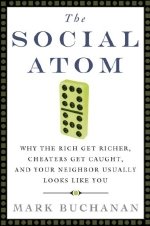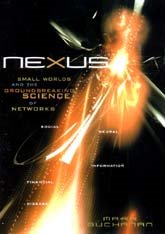A little more to add to my recent post about Stanley's Fish's peculiar attack on atheists Sam Harris, Richard Dawkins and Christopher Hitchens. He suggested that science has no understanding of human altruism, which is simply untrue. I'm no expert in this, to be sure, but I do know a little, because this is mainstream science...
First of all, there is an enormous literature in evolutionary biology on the genetic roots of altruistic behavior among people (or other organisms, even bacteria) who are closely related. The idea -- first argued by the late biologist William Hamilton -- is that, from the "selfish gene" perspective, acting altuistically toward close relatives tends to aid the passage of your own genes into the next generation, because your close relatives, to a great extent, have the same genes you do. This has been the subject of countless books; essentially anything written by Dawkins explains it quite clearly, and there's masses of empirical evidence supporting the importance of this mechanism in establishing altruism in the real world.
Interestingly, biologists are finding that this mechanism for cooperation has huge consequences, even in communities of organisms as simple as bacteria. In a bacterial colony under stress, for example. many bacteria will spontaneously sacrifice themselves for the good of the group. You can't see our human love and devotion to family as anything unique to people; it runs all through biology as a major theme. I wrote about this a couple of years ago for New Scientist.
At another level, there's also a huge literature in economics and biology on the subject of so-called reciprocal altruism, or what might be called "strategic" altruism -- the way we learn to get along with others because we benefit from cooperation. Probably the best book on this, and certainly the most fascinating, is the classic by Robert Axelrod, The Evolution of Cooperation. People learning to get along isn't a mystery either -- it's often just a good way to get by in a difficult word, and to benefit from the fact that together we can do more than apart (not that I mean to imply that the details of how this all works are simple or not the matter of continuing argument).
So maybe Fish has in mind "pure" altruism -- people running into burning buildings to save strangers, or giving tips to waiters in foreign lands they'll never visit again? Although hard-boiled economic rationalists tried to deny that such altruism existed until recently, a tidal wave of recent experiments has shown that it is certainly real. In experiments -- see the work of Ernst Fehr, for many fascinating examples -- many people will willingly act to help strangers even when they remain anonymous, and the interaction takes place only once, so there can be no hope of reciprocal gain in the future. How do you explain this?
I've written about some of the current work in this area in my book The Social Atom. Although there is still controversy in this area -- hardly surprising, as it is at the forefront of current research -- one strongly persuasive idea is that "pure" altruism of this sort probably evolved because it helped the small groups of our hunter gatherer ancestors to coordinate themselves for collective tasks such as hunting, providing for the collective defense, and so on. Even though being a pure altruist hurts individuals in rough interaction with other individuals -- in the battle for mates, or scraps at the table -- it helps in the battles between different groups. And if the competition between groups is strong enough, this can more than outweigh the costs to individuals, so that group competition effectively produces a fraction of pure altruists. To read some of the good work in this area, I recommend the work of anthropologist Robert Boyd, among others.
Anyway, this post has become long enough. I think I've at least established that there isn't no science of human altruism. I'm not sure what Mr. Fish was thinking. Having said that, I have enjoyed many of his other articles for the NYT.
Monday, June 18, 2007
Sticking your neck out (II) -- Mark Buchanan
Subscribe to:
Post Comments (Atom)




3 comments:
For those not familiar with Stanley Fish the wikipedia entry will make his particular take on social behavior quite clear.
http://en.wikipedia.org/wiki/Stanley_Fish
I very much enjoy Mr. Buchanan's writing. I spent more than thirty years in the social sciences (as an anthropologist) which are often what I call "assertion based" sciences (once stated an assertion becomes "a fact"). Anthropology, Sociology, and Psychology have all had a hard time coping with the evolution of social behaviors. As one sociologist expressed it to me, "If there are rules of human behavior -- I don't want to know them." It was not until 1990 that an anthropologist was able to write a book entitled "Human Universals." Just today I read (once again) that hunter gatherer societies were/are "egalitarian." Not so, but recall the enthusiasm with which so many (including social scientiests) bought into the story of "The Gentle Tasaday" who were a complete hoax, but who were thought to have the attributes so many thought our ancestors would have had. Anthropologist Napolean Chagnon was academically lynched by many anthropologists for demonstrating why a group of South American Indians were "fierce." E.O. Wilson of Harvard was physically attacked for a chapter in his book "Sociolobiology" (1975 and well worth reading) on the evolution of human behavior. The idea that social behavior may actually have a fairly simple structure is not favored by social scientists in general and leads to the dread charge of being "a reductionist."
Thanks for that comment. I'll have a look at Stanley Fish's wikipedia entry, which I haven't yet done.
Interesting background. While it seems that in non-human science (especially physical science) we can investigate and accept whatever we find, whether it fits our preconceptions or not, we cannot do this as easily in the human sciences. Mark
Thanks for shariing
Post a Comment